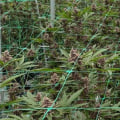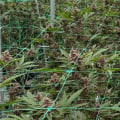A genetically modified BC SEEDS strain called Forever Buds could potentially be a perennial marijuana strain. Traditionally, cannabis plants are not perennial but annual. This means that they only go through one growing cycle and only last for one growing season. Growing cannabis from seed, rather than using root systems, also contributes to the status of an annual crop rather than a perennial crop.
If cannabis growers opt for this natural growth cycle, the cannabis plant will begin to live as a seedling in spring. Then it blooms in summer and is ready to harvest in autumn. Since the plant develops naturally to follow this particular growth cycle, the health of the plant will likely suffer if you buy an annual cannabis plant and try to grow it as a perennial. Most people know that cannabis plants go through their lifecycle in one year.
They start to grow in spring, mature in summer and gain big buds in autumn. This is the traditional lifecycle of cannabis strains. We also have autoflowering strains that grow very fast. In addition, the cloning mechanism involved in keeping cannabis plants under 24 hours of daylight.
However, are marijuana plants perennial? This brings us back to the question: are marijuana plants perennial? Not. Therefore, cannabis plants can only undergo a single growth cycle and only last one growing season. Since cannabis is the result of seeds rather than root systems, it makes it an annual crop. Since cannabis is annual, its life cycle will begin its life as a seedling in the spring.
In summer it blooms and is ready to harvest in autumn. Since cannabis is naturally an annual plant, trying to grow it as a perennial will lower the health of the plant. We already know that marijuana is not a perennial plant. Cannabis is a dioecious and sexual plant.
However, according to some botanists, cannabis plants can be perennial. This can occur when the climate in which the plant grows changes, forcing the plant to adapt. Some botanists point out that perennial cannabis plants can be found in many tropical and subtropical regions. These plants bloom in autumn before moving into a slow growth phase.
During the spring, plants return to their vegetative growth stages before continuing into the fall. The climatic zone will determine the ability of plants to become a perennial. In very cold climatic zones, frost can destroy the plant and make it unable to grow. There are many drugs that flood the market today.
Some of these drugs have no medicinal value, but what medicine does it have?. Cannabis is an annual flowering plant, its life cycle is limited to a single season. In nature, it grows from a seed, blooms and dies, all between spring and fall. Once a female plant dies, it drops the seeds, which are responsible for transporting the genes until the next growing season.
By cloning a cannabis plant, you could theoretically keep clones of the same cannabis plant for years. Growing cannabis in pots adds tremendous interest to any patio or living area, and ensures that those with limited space can enjoy cannabis gardening. Since you're unlikely to grow perennial cannabis, you'll need to look for other options if you want to harvest cannabis on an ongoing basis. Although most cannabis plants are annual, some companies claim that they have developed their own cannabis seeds that have cultivated the plant for decades.
For those looking for a more hands-on cannabis gardening experience, the orchard can be a perfect place for cannabis. From there, you need to determine how often you want to harvest your cannabis strain, taking into account the maturity time of your cannabis strain. But wouldn't it be amazing if you could plant a cannabis plant and get a continuous harvest every season without worrying about changes in the light cycle or the cold? Imagine how much yield a plant could yield after a couple of years because, as we all know, cannabis grows incredibly fast and can give many times more fiber mass than trees in a year. Medical cannabis is defined as the use of synthetic forms of cannabis and cannabinoids for certain diseases, as a form of treatment recommended by a doctor.
. .






